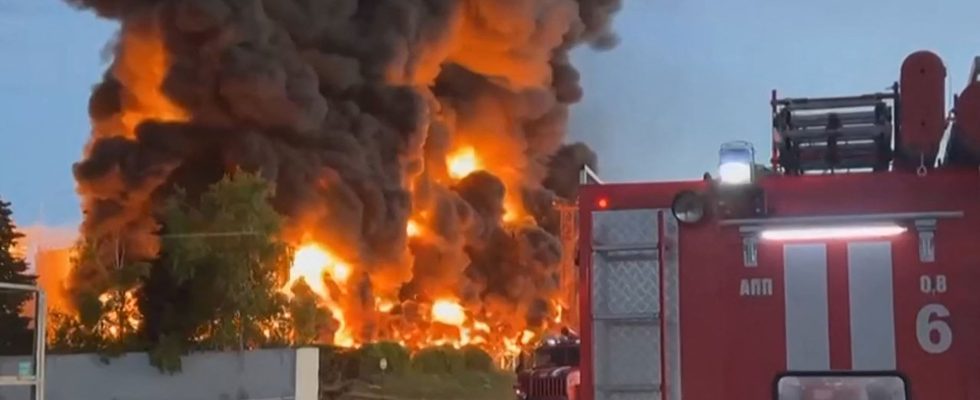Acts of sabotage are on the increase, heralding a new era in the conflict. Russia and annexed Crimea are the target of a series of attacks which kyiv, which recently claimed that its preparations for a counter-offensive were nearing completion, has not claimed responsibility for. This Tuesday, May 2, a Russian freight train derailed after the deflagration of an explosive device. The second in two days.
According to Ukrainian Defense Minister Oleksii Reznikov, the attacks precede the counter-offensive intended to recover the territories occupied by Russian troops. On Monday May 1, he announced on national television that the army was “reaching the finish line” of its preparations, while affirming that commanders will decide “how, where and when” the counter-offensive will be carried out. “Everything is on the way to carry out this counter-offensive. Now we have to wait for the weather to improve so that the armored vehicles can go on dry ground […]”, explains to L’Express, General Dominique Trinquand.
To carry out this counter-offensive, kyiv waited to obtain the necessary equipment provided by the West, the quantity of sufficient ammunition, as well as trained military personnel. “This offensive is essential for Ukraine. If Kiev succeeds, it can upset the Russian command. If it fails, it will not have reinforcements for a long time. It’s a single-shot gun,” the general continues. Dominique Trinquand.
“Hit Strategic Goals”
In the meantime, sabotage operations have multiplied. Monday, May 1, an explosion derailed a freight train, which partly caught fire, near the town of Ounetcha, located about sixty kilometers north of the Ukrainian border. No casualties were reported. According to Russian authorities, the train’s locomotive and two tanks caught fire after derailing and the fire was brought under control by firefighters. The company claims that, in addition to the locomotive, seven cars derailed: four of them contained hydrocarbons, the others building materials.
The incidents come after a Ukrainian strike that killed four people in a village in the Bryansk region on Saturday evening. The day before, a drone attack caused a huge fire in an oil depot in annexed Crimea. Impressive images of a large black smoke mushroom circulated on Ukrainian social networks. Quoted by the public news agency Ria Novosti, the governor of Sevastopol, Mikhail Razvojayev, then told journalists that a total of four oil tanks had been damaged and “burned”. “The idea is to hit strategic targets. The Americans use the expression shape the Battlefield (shaping the battlefield) so that objectives such as logistics or commands are attacked”, explains General Dominique Trinquant.
Through these sabotage operations, the Ukrainians intend to weaken the Russian defense, which cannot ensure a reinforced presence on a front longer than the western front of the First World War (about 900 kilometers). While the Ukrainian soldiers will have to break through a defensive line, the Russians are sharpening their defense. “There are three lines of defense 120 kilometers deep with trenches, dragons’ teeth (anti-tank defense means made of concrete blocks) and minefields. The Russians must also prepare forces capable of counter- attack if the Ukrainians break through the defences”, continues Dominique Trinquand.
A “tragedy” for Russia
Another stated objective: to reach Moscow morally. If the official Kremlin press continues to relay air strikes that would impact the Ukrainian army, this optimism contrasts with the words of the head of the Russian private military group Wagner, Yevgeny Prigojine. On Sunday, he declared that his men, who are fighting in particular in Bakhmout (eastern Ukraine), lacked ammunition and warned that a Ukrainian counter-offensive could represent “a tragedy” for Russia. What are the offensive capabilities of Vladimir Putin’s army like? ” They are reduced and we saw it well in Bakhmout. Its army rather follows a strategy of nibbling by the use of artillery and infantry. It has lost a lot of armored vehicles and the Russian offensive has a capacity limited,” replies the general.
Moreover, these sabotage operations risk chipping the veneer of a safe country that Russia is trying to keep. On Tuesday, the Kremlin recognized the current security threat. “Of course, we are aware that the Kiev regime, which is behind a number of these attacks, terrorist attacks, intends to continue on this path,” said its spokesman Dmitry Peskov. “Our intelligence services are doing everything necessary to ensure security,” he added. In recent weeks, the Russian authorities have been insisting that the terrorist risk has increased. Many public events organized in early May for major national holidays were canceled due to threats deemed too high.
Moreover, these attacks coincide with the publication of the latest US intelligence estimates on Russian losses: 100,000 victims – including 20,000 killed and 80,000 injured – since December 2022 in fighting on the front. This is enough to undermine the morale of Russian public opinion as May 9 approaches, the date which marks the victory over Nazi Germany, the high point of President Vladimir Putin’s regime. In 2022, this anniversary was seen as a deadline for the Russian authorities in their conquest of Ukraine. This year, the parade to the glory of the Russian army is likely to have lead in the wing.
